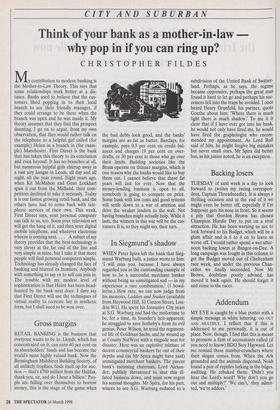In Siegmund's shadow
WHEN Peter Spira left the bank that Sieg- mund Warburg built, a junior wrote to him: `I will miss you, because I have always regarded you as the outstanding example of how to be a successful merchant banker without being an unmitigated sod — in my experience a rare combination.' (I bowd- lerise.) How rare, we can now judge from his memoirs, Ladders and Snakes (available from Heywood Hill, 10 Curzon Street, Lon- don W1). He spent his formative City years at S.G. Warburg and had the misfortune to be, for a time, its founder's heir-apparent; he struggled to save Sotheby's from its evil genius, Peter Wilson, he tried the regiment- ed life of Goldman Sachs, and he wound up at County NatWest with a ringside seat for disaster. Here was an explosive mixture of decent commercial bankers far out of their depths and (as Mr Spira might have said) unmitigated merchant bankers. The parent bank's incoming chairman, Lord Alexan- der, publicly threatened to shut this ill- fated business down, and must now regret his second thoughts. Mr Spira, for his part, winces to see S.G. Warburg reduced to a subdivision of the Untied Bank of Switzer- land. Perhaps, as he says, the regime became oppressive, perhaps the great man found it hard to let go and perhaps his suc- cessors fell into the traps he avoided. I once heard Henry Grunfeld, his partner, quote Goethe about him: 'Where there is much light there is much shadow.' To me it is clear that if I have ever got into his bank, he would not only have fired me, he would have fired the graphologist who recom- mended my appointment. As Lord Roll said of him, he might forgive big mistakes but never small ones. Mr Spira did better but, as his junior noted, he is an exception.


































































 Previous page
Previous page